Constituent Colleges
Sri Ramachandra Faculty Of Occupational Therapy
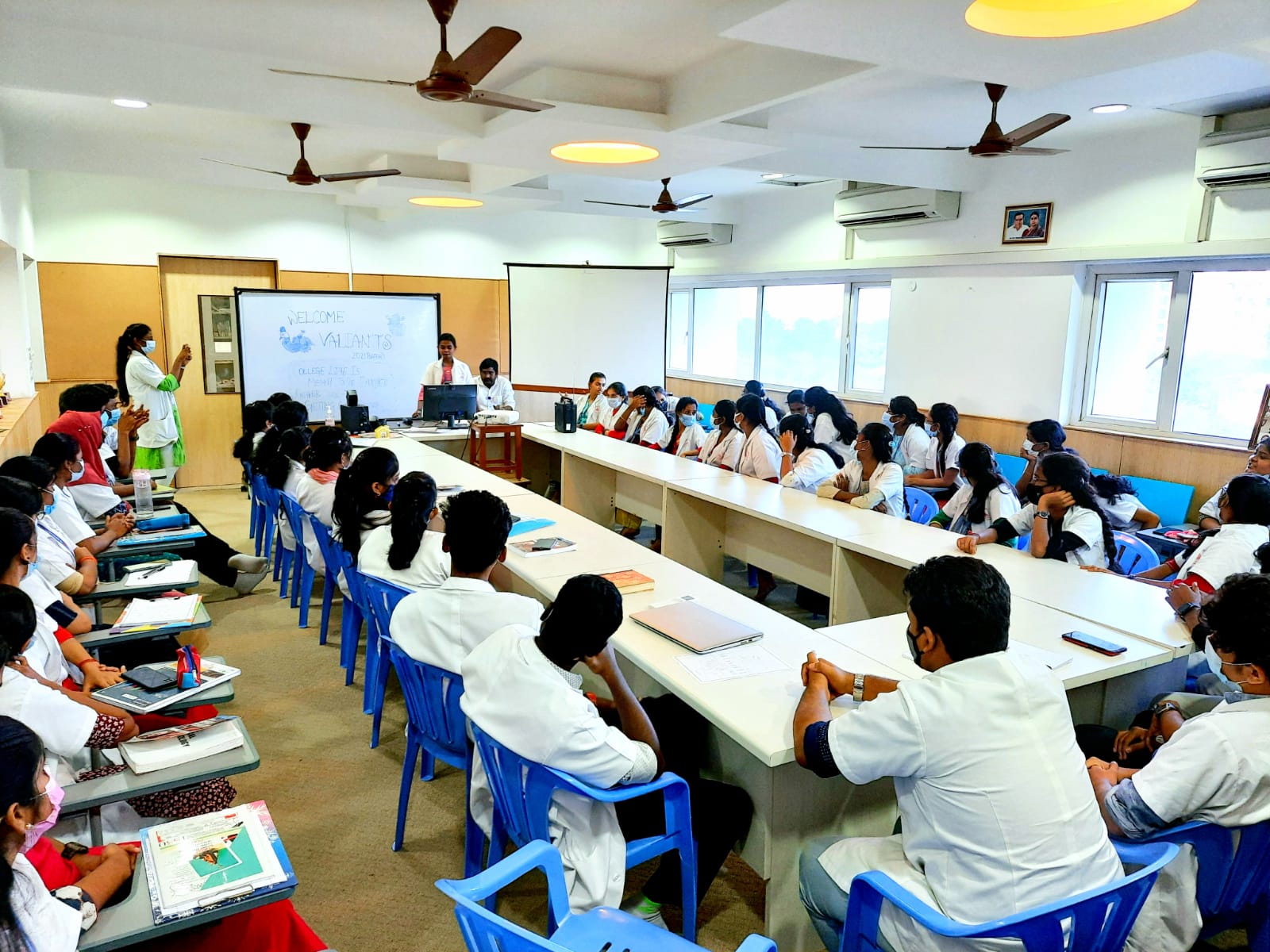
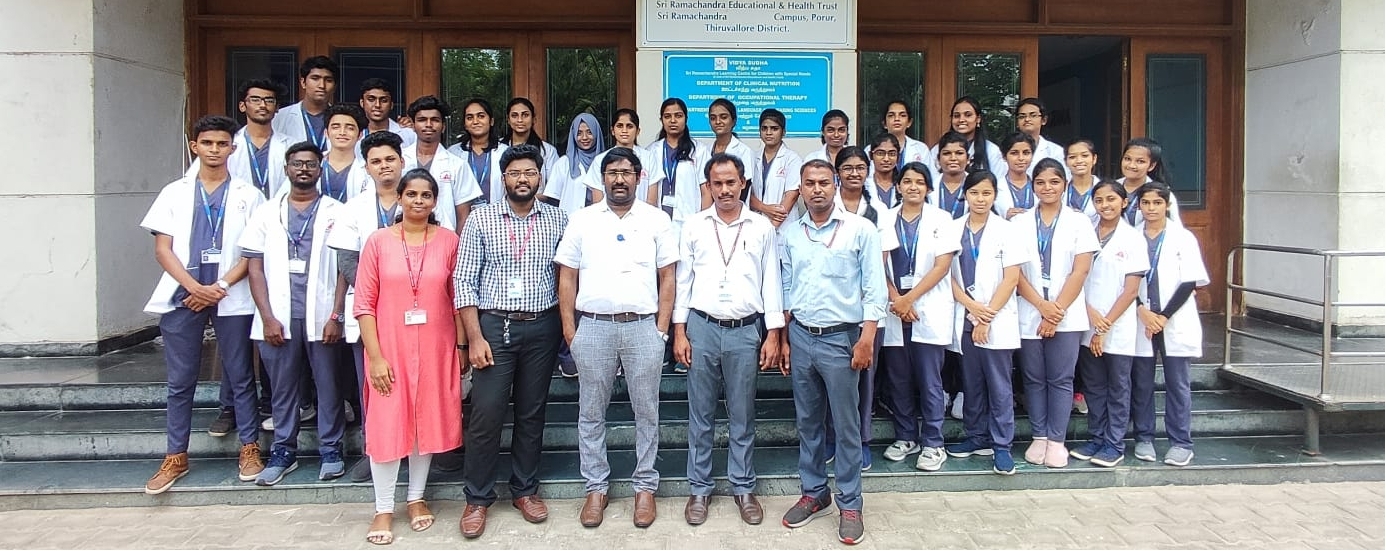
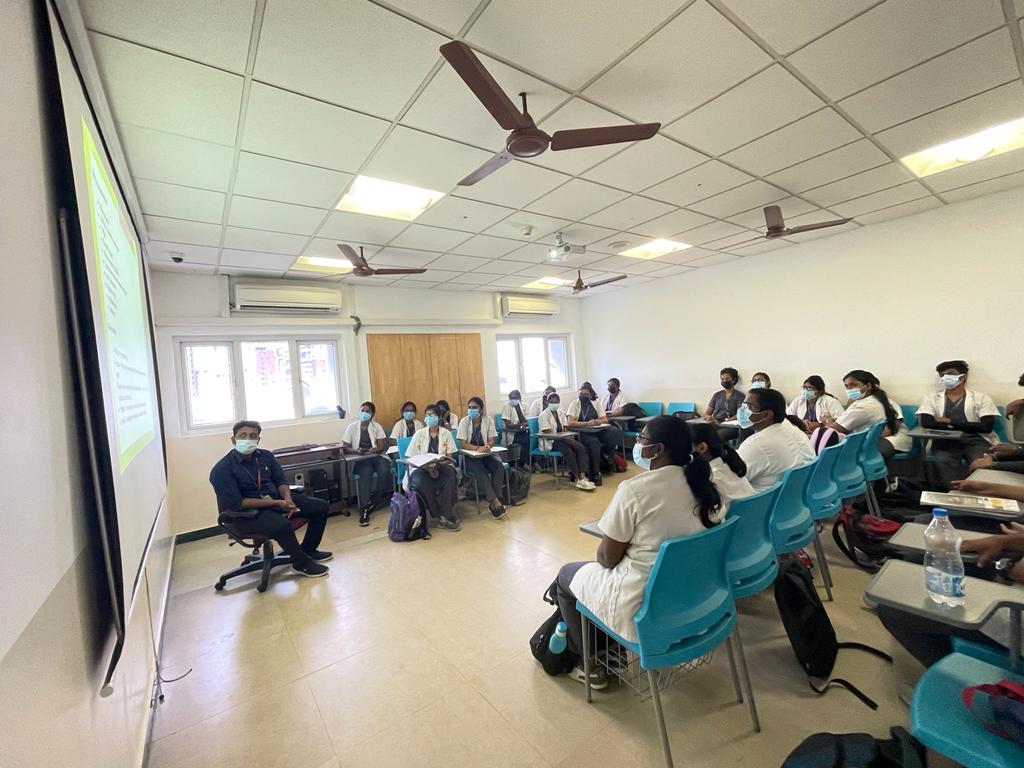
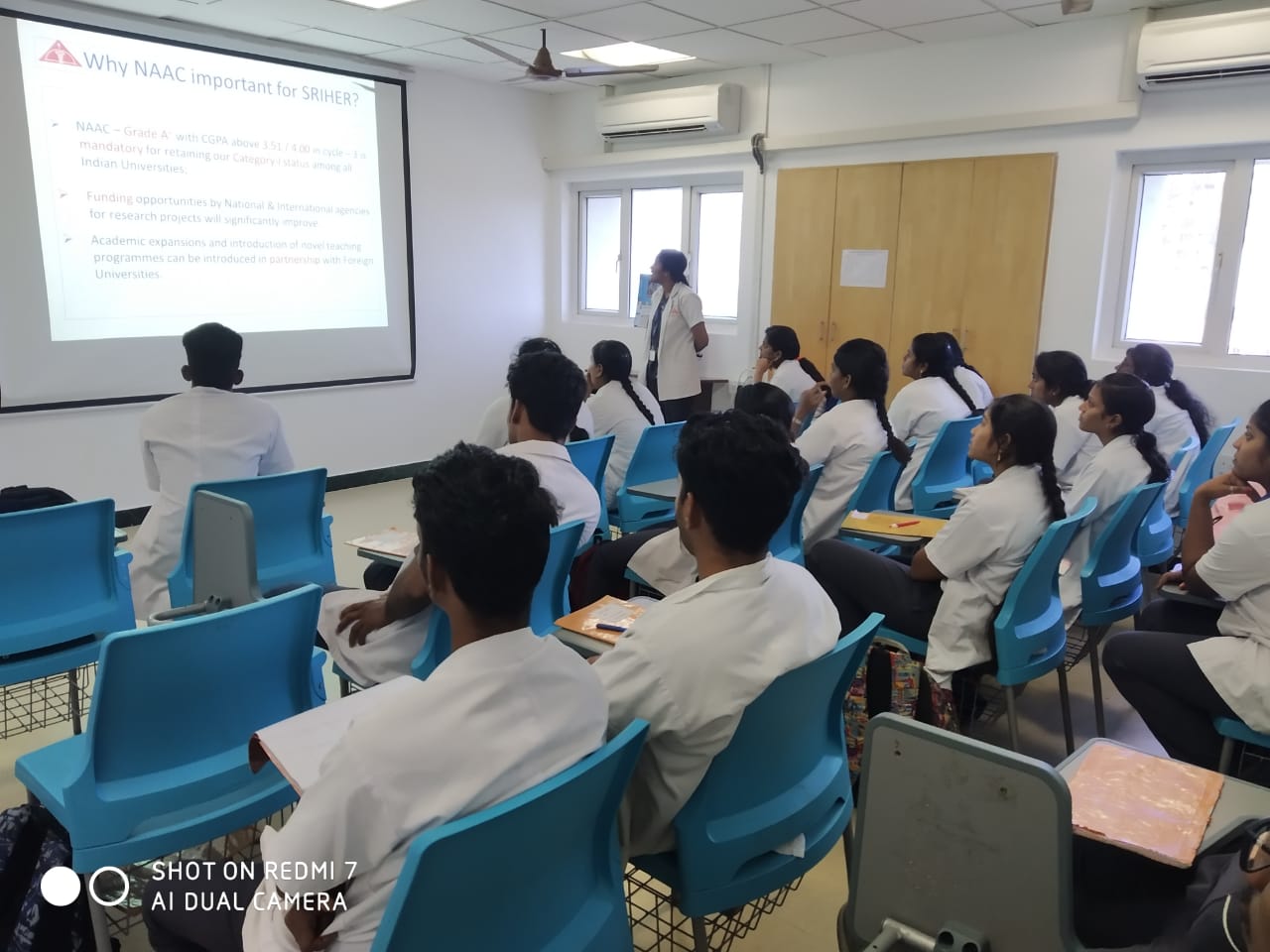
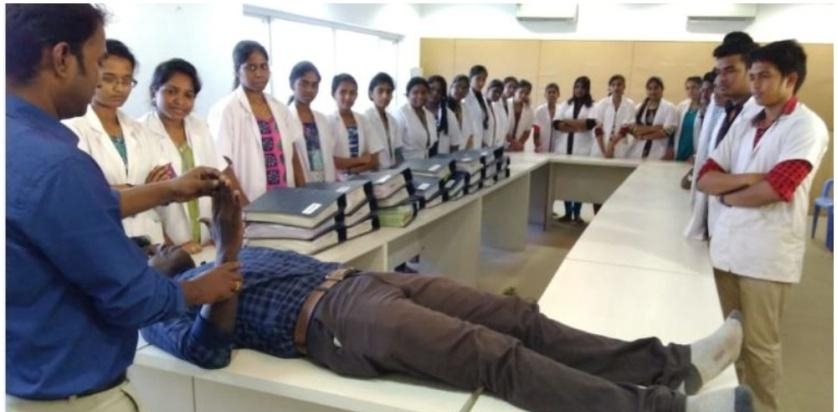
Academics
PROGRAMS OFFERED:-
The Occupational Therapists are generally practicing in the areas of:-
Bachelor of Occupational Therapy (B.O.T) - 4 Years & 6 month compulsory internship:
Bachelor of Occupational Therapy programme is a 4 years and 6
months of compulsory internship. The medium of instruction is English.
After passing the prescribed examinations conducted by University, the
students will have to complete six months of internship. The successful
students will be awarded the Degree of Bachelor of Occupational Therapy
(BOT) by the University.
Bachelor of Occupational Therapy (B.O.T) - Programme commences in the month of July every year.
ELIGIBILITY:-
The eligibility criteria are passed with a minimum 50 % in HSC (+2) with English, Physics, Chemistry and Biology (or) Botany and Zoology and should be of age 17 years or above. Candidates who are desirous of joining BOT Degree will admit through Entrance Examination or interview and counseling conducted by the University.
The eligibility criteria are passed with a minimum 50 % in HSC (+2) with English, Physics, Chemistry and Biology (or) Botany and Zoology and should be of age 17 years or above. Candidates who are desirous of joining BOT Degree will admit through Entrance Examination or interview and counseling conducted by the University.
MASTER OF OCCUPATIONAL THERAPY (MOT):
Duration: 2 years
Program commences in the month of July/August every year.
Eligibility:
- A candidate must possess the following qualifications: A Bachelor of Occupational Therapy degree (with not less than 4½ years duration including 6 months of internship) of Sri Ramachandra Institute of Higher Education and Research or of any other recognized university as equivalent thereto obtained through full time regular class room mode. The candidate must have completed BOT Program from on AIOTA accredited Institution
- A candidate shall at the time of admission submit to the Head of the Institution, a Certificate of Medical Fitness from an authorized Medical Officer certifying that the candidate is physically fit to undergo the academic program and does not suffer from any disability or contagious disease.Specialties in M.O.T
1. Masters of Occupational Therapy in Peadiatrics.
2. Masters of Occupational Therapy in Neurology.
3. Masters of Occupational Therapy in Hand & Musculoskeletal Rehabilitation.
4. Masters of Occupational Therapy in Mental Health.5. Masters of Occupational Therapy in Oncology & Palliative Care.
Masters of Occupational Therapy (Peadiatrics, Neurology, Hand and Musculoskeletal Rehabilitation, Psychiatry & Oncology and Palliative Care) - For additional information on the following programs, click on the link below. - Oncology Brochure.
- Occupational Therapists are Health care and Rehabilitation professionals. Occupational Therapists uses assessment and intervention to develop, recover, or maintain the meaningful activities, or occupations, of individuals, groups, or communities.
- Occupational Therapy practitioners enable people of all ages to live life to its fullest by helping them promote health, and prevent or live better with injury, illness, or disability and often works with people with mental health problems.
- The word “Occupational” in Occupational Therapy can be misleading. This profession is not about vocational counseling or work training. Occupational Therapists often work on a team with other rehabilitation professionals, but the Occupational Therapist roles are distinct. Occupational Therapists focus on how that function affects the ability to do the things that are important to them. Various health issues can pose barriers to participating in daily activities.
- Learn new ways of doing things.
- Regain skills and develop new ones.
- Use materials or equipment’s that makes life easier, or
- Adapt their environment to work better for them.
- An individualized evaluation, during which the client/family and Occupational Therapist determine the person's goals.
- Customized intervention to improve the person's ability to perform daily activities and reach the goals, and an outcomes evaluation to ensure that the goals are being met and/or make changes to the intervention plan.
- Use effectively ‘job modification’ techniques in work place based on ergonomic principles to achieve good quality of life in community.
- Use early intervention programme for neonates & school children to prevent secondary changes & learning disabilities.
- Occupational Therapy interventions include helping children with disabilities to participate fully in school and social situations, helping people recovering from injury to regain skills, and providing supports for older adults experiencing physical and cognitive changes.
Career options and opportunities:-
The Occupational Therapists are generally practicing in the areas of:-
- Government Organization / Institutions /Hospitals / Research Projects.
- Non-Government Organizations(N.G.O’s).
- Private sectors like Acute Care Hospitals & Nursing homes/ Chronic Care Facilities.
- Rehabilitation Centers / Clinics / De- Addiction centers etc..
- State & Central Govt. Projects.
- Special Schools/ Main Stream Schools.
- Social Agencies/Community Based Rehabilitation (CBR) & Disaster Management Projects.
- Hospice Care facilities.
- Mental Health Setups (Shelter Workshop, Half Way Homes etc.,).
- Day Care Centers.
- Vocational Programs.
- Insurance Companies.
- Industries/Ergonomics.
- Self Employed.
- Health Promotion, Disability Prevention/Management, Accessibility programs and more.
Disciplinary Guidelines:
The student manual and calendar have details regarding general disciplinary rules, dress code, anti ragging instructions, restriction on use of cell phones, attendance and progress, and rules for the hostel students.
The student manual and calendar have details regarding general disciplinary rules, dress code, anti ragging instructions, restriction on use of cell phones, attendance and progress, and rules for the hostel students.
Parent’s teachers meet:
Every year, two meeting will be conducted by our department tentatively in the month of February & September.
Every year, two meeting will be conducted by our department tentatively in the month of February & September.
Co Curricular Activities/ Extra – Curricular Activities:
Occupational Therapy students are involving in various co curricular activities and also they are encouraged to participate in CME/Continuing Occupational Therapy Education (COTE), Workshops, Guest Lectures, International, National, and State level conferences are organized by the college and conducted by other institutions and organizations in and around the country.
Participation in national conference of AIOTA (All India Occupational Therapist Association) is encouraged. Students participate in various competitions like paper presentation, poster presentations, model and street play conducted as part of the conference.
College of Occupational Therapy emphasizes on developing the talents and extra skills of the students. Students are encouraged to participate in inter collegiate sport and cultural meet in a regular intervals. The students participates in the University Annual sports and cultural events &organizes various public awareness days like World Occupational Therapy Day, World Autism Day, World Mental Health Day etc., and an inter college cultural competition which provide a stage for the students to explore and enhance their talents.
Occupational Therapy students are involving in various co curricular activities and also they are encouraged to participate in CME/Continuing Occupational Therapy Education (COTE), Workshops, Guest Lectures, International, National, and State level conferences are organized by the college and conducted by other institutions and organizations in and around the country.
Participation in national conference of AIOTA (All India Occupational Therapist Association) is encouraged. Students participate in various competitions like paper presentation, poster presentations, model and street play conducted as part of the conference.
College of Occupational Therapy emphasizes on developing the talents and extra skills of the students. Students are encouraged to participate in inter collegiate sport and cultural meet in a regular intervals. The students participates in the University Annual sports and cultural events &organizes various public awareness days like World Occupational Therapy Day, World Autism Day, World Mental Health Day etc., and an inter college cultural competition which provide a stage for the students to explore and enhance their talents.
Related Links
Call : 044-45928500






